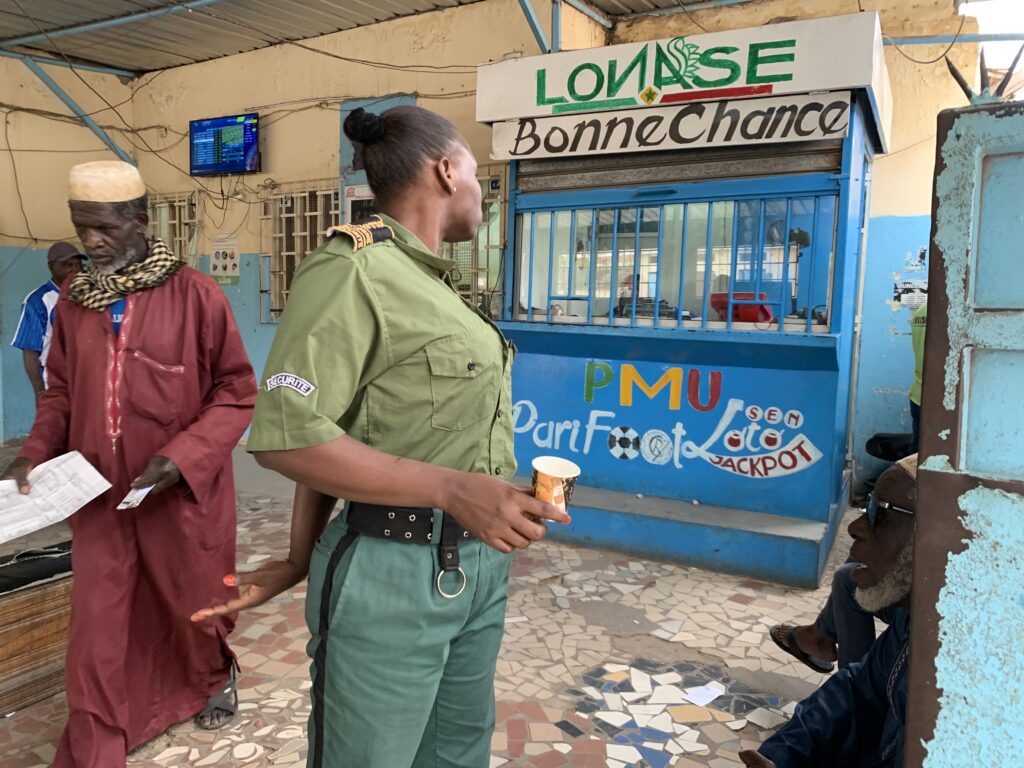In a country with high levels of poverty, betting is a crucial source of last resort income.
When Dickori Baldé wakes up, like yesterday and the day before, he thinks about what boxes to tick with his pen. Like many Senegalese men his age, the 65-year-old retiree has only one way to feed his family: betting.
But gambling and Islam do not mix.
At the betting office of Lonase — the state-owned national lottery — in the city of Rufisque, Baldé says: “This [betting] is an emergency solution. Something we can’t do without. We are all aware of what the religion says.”
“Islam firmly opposes betting under all its forms,” admonishes sheikh Oumar Diallo. He is an imam of a mosque in Parcelles Assainies, one of the 19 counties of Senegal’s capital, Dakar. In a country where at least 95% of the population are Muslim, this proscription is a thorn in the side of many bettors.
Diallo sees sports betting as a gateway as people get used to “an easy way of earning money”.
 The betting office of Lonase
The betting office of Lonase
But survival is at least as big a consideration in a country where nearly half of the population lives in poverty.
And, while Islam forbids gambling, the Senegalese government allows it. Lonase is the licensing authority. It says it “partners” with betting agencies such as Sunubet, Premier Bet and 1Xbet.
Serigne Mor Mbaye, a Senegalese psychologist and sociologist, lists sports betting among other last resort steps as “survival strategies to satisfy the needs of large families”. The other strategies include drug dealing, counterfeiting money and sexual exploitation.
Baldé has two wives and nine children. A retired conductor in the trucking industry, he spent 28 years working back and forth between Senegal and Mali. Now he says he wouldn’t be able to take care of his family if it wasn’t for his daily luck on horse races.
Sitting beside him is his 59-year-old friend, Idrissa Sèn, a father of five who says, “God may help us at any time with random money.”
At the bricks and mortar Lonase betting office, most customers are older. But that doesn’t mean the youth bet any less. With cell phones and the internet, betting anywhere is the new deal. And Senegal has one of Africa’s highest internet penetration rates, with 89% of people connected and almost all of those connecting through mobile internet.
The country is also football mad, in no part thanks to its often competitive national men’s team.
Mouhamed Diop has installed the 1Xbet app on his phone. “The money comes real quick and no one can see or judge you,” he says. The Chelsea fan is 30 and in 2019 completed his studies in electromechanics at CNQP, the national school for professional qualifications.
Diop has completed two internships but has yet to find a paying job.
“At my age, I can’t ask anyone for money,” he confides. “If you do not have a job, your only way out is parifoot.”
Parifoot is the local word for football and sports betting. But this is “just a temporary solution until I find something better”. He hastens to add: “I don’t bet during Ramadan.”
In a sentiment regularly echoed in Senegalese betting circles, Diop believes that the money you win from betting is illicit — since Islam forbids the act — and he does not invest it, even if that might help wean him off the habit. He once won 500 000 CFA ($870).
In response to questions, a Lonase spokesperson suggested that, “not only are these bets a challenge for these young people, but they provide them with interesting profits to solve their daily problems.”
Diallo, the imam, thinks the betting culture “perfectly fits the government’s plans”.
Or, rather. its lack of plans.: “A bettor can sit in the same place idling from 8am to 10pm, having no time to follow the government’s actions or to think about ways to move on with their life.”
This article first appeared in The Continent, the pan-African weekly newspaper read and shared on WhatsApp. Download your free copy here